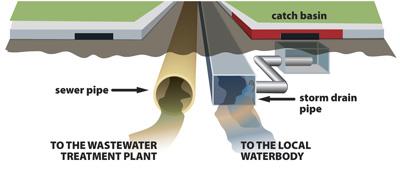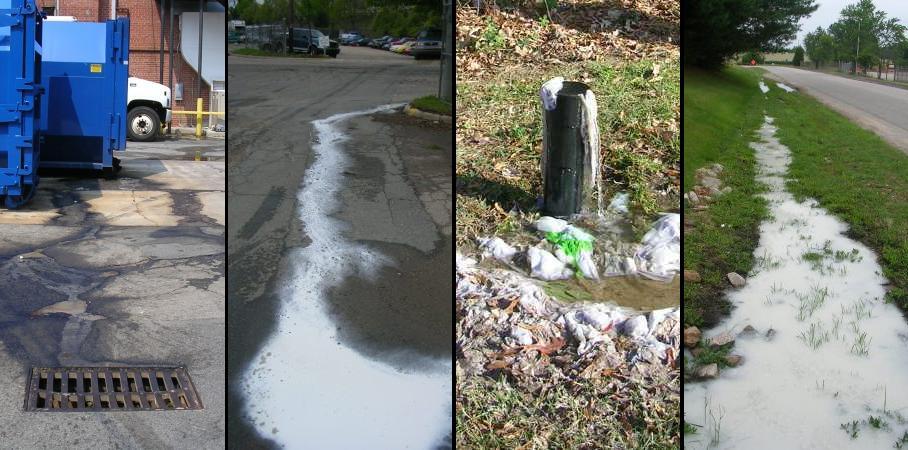In Anne Arundel County, storm drain systems collect stormwater runoff and carry it, untreated, to the nearest waterway or Best Management Practice (BMP). In urban areas, the storm drain system consists primarily of storm drain inlets, underground pipes, and storm drain outfalls. Storm drain inlets are normally located along streets and in parking lots. In rural areas the storm drain system may be in the form of ditches that carry the stormwater along a roadside or piece of property. Storm drain systems are meant to carry only unpolluted stormwater. Putting oil, antifreeze, detergents, and/or other material into the storm drain system is the same as dumping them directly into a stream or river.
In Anne Arundel County, the storm drain systems are not connected to the sanitary sewer system. The sanitary sewer system carries household wastewater and some permitted industrial wastewater to the wastewater treatment plant, where the wastewater is treated before being discharged into a natural water body.

An illicit discharge is the discharge of pollutants or non-stormwater materials into the storm drain system via overland flow, direct dumping, or illicit connections. Illicit connections are pipes or other direct connections that illegally or unknowingly release pollutants or non-storm water materials into a storm drain system or directly into a body of water.

- Field screening of a minimum of 150 storm drain outfalls annually,
- Conducting routine visual surveys of commercial and industrial parcels to find and eliminate pollutant sources,
- Maintaining a program to address illegal dumping and spills,
- Using appropriate enforcement procedures for investigating and eliminating non-permitted discharges,
- Reporting of all illicit discharge detection and elimination activities, and
- Assessment and reporting of damaged or failing storm drain infrastructure.
- Discharges from firefighting activities.
- Discharges from potable water sources not containing chlorine, including dechlorinated water line and fire hydrant flushing.
- Landscape irrigation drainage.
- Discharges from air conditioning condensate.
- Discharges resulting from individual residential car washing.
- Natural springs.
- Diverted stream flows.
- Discharges of uncontaminated water from basement or crawl space sump pumps.
- Discharges of uncontaminated water from foundation or footing drains.
- Flows from riparian habitats and wetlands.
- Discharges from lawn watering.
- Pavement wash waters where spills or leaks of toxic or hazardous materials have not occurred (unless all spill material has been removed) and where detergents are not used.
- Discharges from uncontaminated groundwater.
- Dechlorinated swimming pool discharges. (not including filter backwash)
Illicit discharges cause water pollution by sending pollutants right into our streams, creeks and rivers. To report an illicit discharge, spill, or other environmental violation, call the Anne Arundel County Environmental Hotline at 410-222-7171. In case of emergencies, call 911.
Residents:
Many of our daily activities have the potential to cause stormwater pollution. How you manage your day-to-day activities and property can determine the quality of our local waterways. See the "Education & Outreach page for more information about how to best manage stormwater at your home.
Businesses:
Routine business activities may negatively impact stormwater due to leaks from equipment and stored materials, improper cleaning practices, and over-application of chemicals. It's important that businesses develop "Best Management Practices" to ensure that employees are aware of the proper way to handle and dispose of materials that could have a negative effect on the natural environment. Many industrial businesses are required by the Maryland Department of the Environment to have a Good Housekeeping Plan and/or a Stormwater Pollution Prevention Plan (SWPPP). A SWPPP is a written document that identifies the industrial activities conducted at the site, including any structural control practices, that the industrial facility operator will implement to prevent pollutants from entering the storm drain system. The SWPPP also must include descriptions of other relevant information, such as the physical features of the facility, and procedures for spill prevention, conducting inspections, and training of employees. The SWPPP is intended to be a “living” document, updated as necessary, such that when industrial activities or stormwater control practices are modified or replaced, the SWPPP is similarly revised to reflect these changes.
